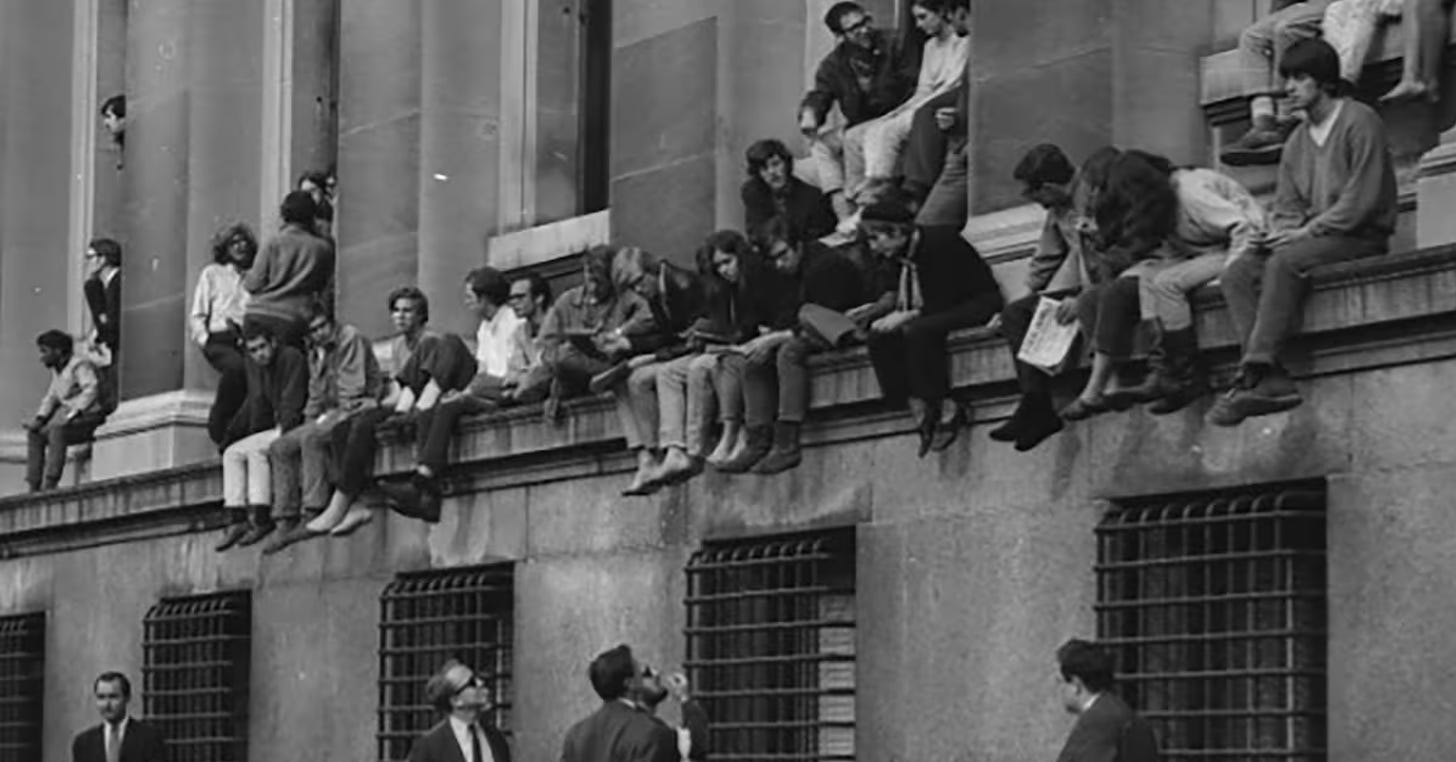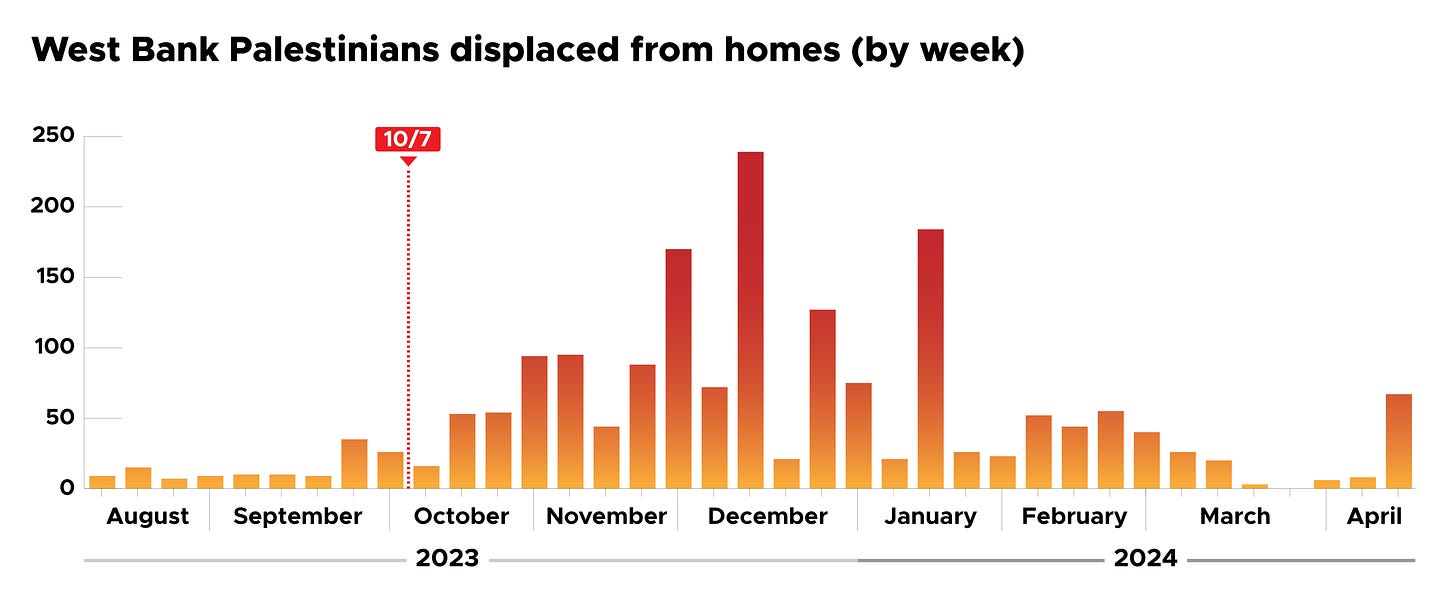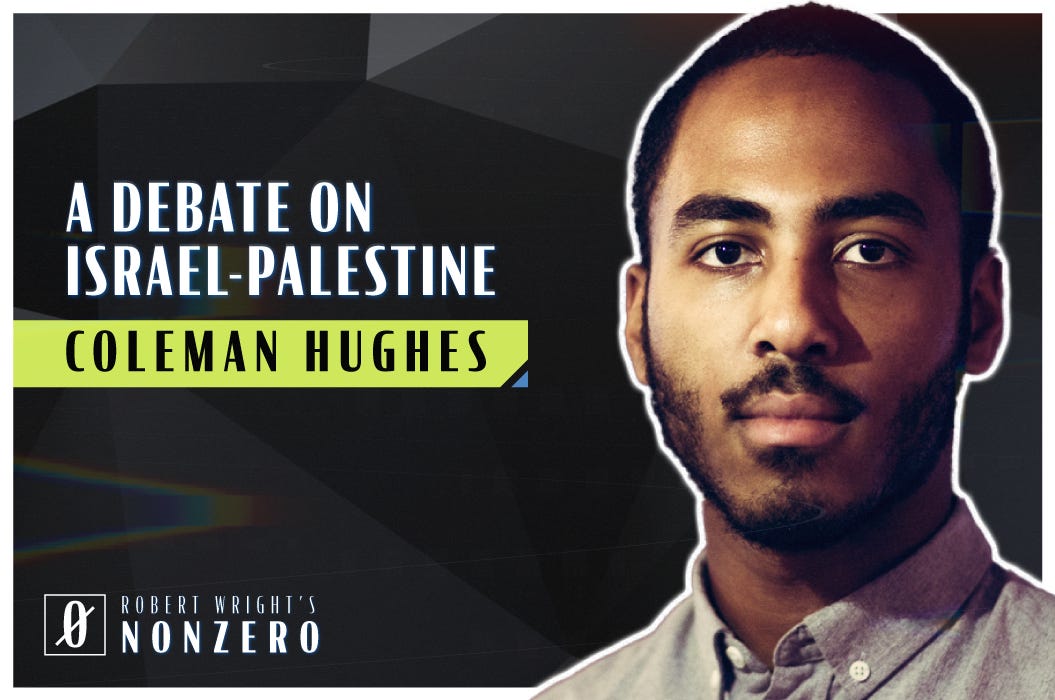This Feels Like Vietnam (but not enough)
Plus: America’s techno-industrial complex, a debate with Coleman Hughes, AI as social scientist, West Bank ethnic cleansing update, dangerous poop-eating chimps, and solar-powered AI.

Save the date: We’ll be hosting an Ask-Bob-Anything Zoom call for paid NZN subscribers on Friday, May 17 at 6 pm US Eastern Time.
The last two weeks have been more reminiscent of the Vietnam War era than any two weeks since… the Vietnam War era. After the mass arrest of students at Columbia University failed to squelch their anti-war protest encampment, the attendant publicity helped inspire protests, and encampments, at campuses across the country.
We’re nowhere near peak Vietnam. As someone old enough to dimly remember the protests of the late 1960s (if not old enough to have participated in them), I can assure you that college students are capable of getting way more unruly than college students have gotten lately.
Nonetheless, this week various authority figures decided that this whole thing has gone far enough. Texas Governor Greg Abbott, declaring that “these protesters belong in jail,” sent 100 state troopers to the University of Texas, where dozens of students were arrested. At Emory University in Atlanta, a burly policeman manhandled a not-very-menacing-looking economics professor named Caroline Fohlin (for not entirely clear reasons), and other faculty members, as well as students, were apprehended, too.
And the Columbia campus (as if it hadn’t suffered enough) received a visit from House Speaker Mike Johnson. Johnson, braving chants of “Mike, you suck!,” called on Columbia’s president, Nemat Shafik, to resign unless she could “immediately bring order to this chaos.” He declared that “if these campuses cannot get control of this problem,” they “do not deserve taxpayer dollars”—and said he and his colleagues would continue “to work on legislation” to that effect. Some of his colleagues, at a congressional hearing earlier in the week, had already gotten Shafik to say that students who used the pro-Palestine chant “From the river to the sea” might be disciplined.
All of this was done in the name of fighting anti-semitism. Which points to one worrisome difference between now and the Vietnam era: The social fissures created by Vietnam-related turmoil weren’t ethnically charged in the way the current social fissures are.
It’s hard to tell exactly how ethnically charged the current fissures are. There no doubt are Jews who genuinely find the ambiguous phrase “From the river to the sea” personally threatening (though of course there are also Jews—young ones, mainly—who chant it). And there no doubt are Jews who have faced unambiguous ethnic slurs, or worse. But it’s hard to tell how much of this is going on.
That’s partly because we’re viewing it through the funhouse mirror of modern media and social media. (Today’s mental health reminder: Whatever your ethnicity and ideology, your social media feed, unless you’ve taken creative countermeasures, is basically a machine that scans the planet for the video snippet that will most outrage you and then presents it to you as if it were typical.) But another reason it’s hard to get a fix on the extent of the anti-semitism is because so many political actors have an interest in exaggerating it.
Sen. Tom Cotton—who has a big constituency of enthusiastically pro-Israel evangelicals—says we’re seeing “a nascent pogrom on these campuses.” Bibi Netanyahu (who is also said to have pro-Israel leanings) declared this week that “antisemitic mobs have taken over leading universities. They call for the annihilation of Israel. They attack Jewish students. They attack Jewish faculty. This is reminiscent of what happened in German universities in the 1930s.”
During the Vietnam era, protesters were sometimes accused of being stooges of China or the Soviet Union. The contemporary version of that comes courtesy of Jonathan Greenblatt, president of the Anti-Defamation League. Greenblatt said this week that the student groups who organize these protests are “campus proxies” of Iran. Greenblatt singled out both Students for Justice in Palestine and Jewish Voice for Peace, leading foreign policy analyst Matt Duss to observe that “the head of the ADL thinks it's fine to accuse *some* Jews of being agents of a foreign power.”
The ADL—as Duss and other veterans of DC’s Middle East policy wars know—has long worked to stigmatize harsh critics of Israel. And it has not been alone in this struggle. Influential journalist Bari Weiss, for example, has said that anyone who opposes Zionism is anti-semitic (which would make lots of Jews anti-semitic). Weiss has also said that Rep. Ilhan Omar is anti-semitic because she asserted that AIPAC—a lobby that, like other lobbies, influences politicians by steering money to their campaigns—is a lobby that influences politicians by steering money to their campaigns.
So it was no surprise when an article turned up in Weiss’s periodical, Free Press, written by a college student who began the piece with this sentence: “I was stabbed in the eye last night on Yale University’s campus because I am a Jew.” And it was no surprise when a video of the incident—in which a protester had allegedly used a Palestinian flag to do the stabbing—suggested that maybe that sentence was overstating the case by an order of magnitude or so.
Weiss’s periodical is called Free Press because she is a fierce defender of free speech in some contexts—like when woke students try to silence conservative campus speakers. As various people have noted, there’s some tension between this position and Weiss’s attempts to expel forceful critics of Israel from the realm of acceptable discourse by calling them anti-semites.
Some free speech warriors are more consistent. Consider Norman Finkelstein, who appeared on the Nonzero podcast a year ago and has long demonstrated that you can oppose the suppression of both conservative voices and left-wing voices. Indeed, Finkelstein’s uncompromisingly left-wing take on Israel led to the wrecking of his academic career (as recounted in his memoir I’ll Burn That Bridge When I Get to It!). This week Finkelstein was invited to speak to protesters at the Columbia encampment. What he said seemed to take some of them by surprise.
He suggested a modest amendment of their standard chant: Rather than say, “From the river to the sea, Palestine will be free,” say, “From the river to the sea, Palestinians will be free.”
Before making this suggestion, he had humbly laid out his way of thinking about political slogans: “The future belongs to you, not to me… You have to decide for yourselves. But in my view you’ve got to pick the slogans (a) which are not ambiguous, leaving no wiggle room for misinterpretation, and (b) have the largest likelihood at any given political moment to reach the largest number of people.” He traced this conviction back to the Vietnam era, when he was a follower of Chairman Mao, who had said “Unite the many, defeat the few.”
I suspect that Finkelstein, in his heart, would like the protesters to drop the “River to the sea” formulation entirely. It doesn’t meet his “not ambiguous” criterion. And at the outset of his talk, before he suggested the fine tuning of that slogan, he’d said that shortly after October 7, protesters had “intuitively” found “the right—in my opinion—the right slogan, and the slogan was ‘Ceasefire now.’ ”
I’d just as soon they’d stuck with that slogan—and maybe supplemented it with something like “Equal rights for Palestinians” (except more euphonic). For one thing, this would cause less pain. There are Jews in America who, for understandable historical reasons, recoil at the sound of “From the river to the sea,” regardless of what the various people who use the phrase may mean by it.
What’s more—and this is something Finkelstein stressed—less ambiguous language is less susceptible to cynical weaponization by the various actors who want to silence critics of Israel. Such language might also help broaden the protest movement, putting more pressure on Biden to push Israel toward a deal that would end the war and free the hostages. As Finkelstein said—not in so many words, but clearly enough—a change in the protesters’ messaging would be good for the people of Gaza.
Here’s a way of putting this that I think Finkelstein would sign on to: Maybe these protests would be more broadly appealing, and more effective, if they were more like the Vietnam protests—if they kept the anti-war message closer to their core. More than you might think, the protest movement of the 1960s was a coalition, involving different causes and different factions, and even some internal tension. But one message everyone could get behind was “Stop the War!” I think this common denominator gave power to some of the coalition’s other causes, and that it could do that for the Palestinian liberation movement today.
Finkelstein’s message didn’t carry the day. After he finished speaking, he got a polite round of applause, but the protester who took the microphone from him, rather than use it to thank him, immediately and pointedly led the crowd in a chant: “From the river to the sea, Palestine will be free.” —RW
Yesterday, author and social critic Coleman Hughes came on the Nonzero podcast to debate the Israel-Palestine issue. While Coleman’s views on the conflict differ markedly from mine (hence the debate), our exchange was civil and illuminating. Here is an excerpt:
Coleman Hughes: You miss the forest for the trees. The fundamental issue, and this is what explains… not only Palestinian terrorism since 2005, not only in the 90s and 80s, but also before the occupation started—the founding of the PLO in 1964, the Palestinian attack on the Yishuv, the pre-state Jewish community in 1947—what ties it all together is this fundamental fact that the Palestinian identity is, in some sense, equal to the belief that the Jews don't belong in historic Palestine, and that they're colonizers, that they're colonizers themselves, and that they're an arm of colonial entities, initially Britain and now America, and that they can be driven out the way that other indigenous peoples have driven out colonizers in the past.
That is a deep, sacred feeling in Palestinian identity. And that's what makes this conflict so intractable.
To hear my devastating riposte, you’ll have to wait for the podcast to air next week—or, if you’re a paid NZN subscriber, you can watch or listen to the conversation here (or listen on your special velvet-rope members-only podcast feed—which you can set up at that same link if you haven’t done so already).
Needless to say, if you’re not yet a paid subscriber, there’s a way to become one. We need this kind of support and we’re very grateful for it. —RW
The rate of ethnic cleansing in the West Bank, which had subsided over the past three months after its post-October 7 rise, has gone up again. Between April 12 and 15, hundreds of Israeli settlers raided Palestinian villages, setting fire to homes and cars. Four Palestinians died, though whether they were killed by settlers or Israeli forces isn’t clear. (In one video, soldiers can be seen standing by, without intervening, as a settler sets fire to the unoccupied car of a Palestinian.) The rampage was sparked by the killing of a 14-year-old Israeli boy, who went missing on April 12 and was found dead the next day.

Deforestation could start a global pandemic, reports journalist Rachel Nuwer in Scientific American.
When chimpanzees, monkeys, and antelope in a Ugandan forest were spotted eating bat poop, scientists from Scotland and America found the food choice strange. Upon investigating, they learned that tobacco farming had all but wiped out a species of tropical palm trees whose mineral-rich wood the animals had eaten in years past. The scientists also found that the bat poop contained several viruses, including a never-before-seen relative of the SARS-CoV-2 virus, which caused the Covid pandemic.







